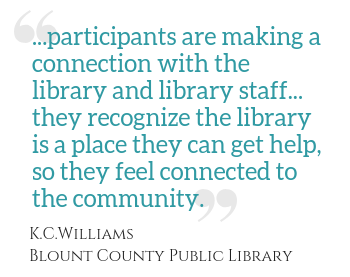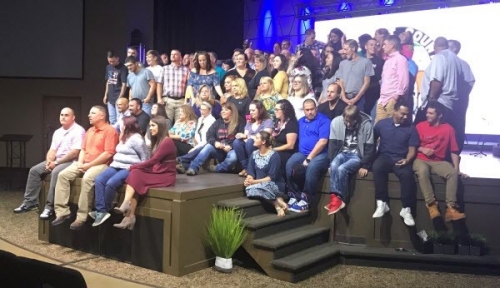Blount County Library Offers Life Skills Training to Participants in Recovery Court
 Much like many local public libraries across the United States, Blount County Public Library in Tennessee, sees the impact the current opioid epidemic and drug addiction is having on its community. Working to combat this is an inventive collaboration between the Blount County’s Public Library and Recovery Court.
Much like many local public libraries across the United States, Blount County Public Library in Tennessee, sees the impact the current opioid epidemic and drug addiction is having on its community. Working to combat this is an inventive collaboration between the Blount County’s Public Library and Recovery Court.
The county’s Recovery Court is an alternative sentencing program offered to nonviolent offenders with a history of drug and alcohol abuse with the goal of lowering habitual criminal activity by providing treatment, monitoring, random drug screens, required employment, community service, education, and payment of fines. As a result of a “creative collision,” between the Blount County Library Director, K.C. Williams, and Blount County Recovery Court counselor, Stephanie Monday, is the Life Skills Curriculum. The development of the curriculum was a joint effort provided by the library to Recovery Court participants that teaches participants necessary skills to succeed as a contributing member of the community. Williams, a former educator, recognized the role the library could play in their community because of the natural fit of providing soft skill services to the community and patrons. “I see librarians as teachers. We provide educational services. I don’t care what we call it. If it’s education for fun or jobs, providing educational services is what we do.”
In 2015, the 15-month curriculum was developed. Participants typically take three to four years to complete Recovery Court and as a result, experience the Life Skills Curriculum twice. Classes are offered four times per week and for two hours each, combining both education and counseling sessions into one meeting. Over 90 participants are engaging in the program currently, and over 50 have completed it. The curriculum includes seven modules with the topics:
- Communication
- Finance
- Social Health
- Physical Health
- Nutrition
- Personal Appearance
- Career Development

In order to optimize success, the curriculum is continually refined as the work progresses to tailor the program to meet the diverse and unique needs of the participants. In addition to the courses and training, participants can schedule time with Ari Baker, the Learning Lab Coordinator, for additional help with connecting to resources introduced in class such as school enrollment, employment assistance, and other needs that may arise as related to the curriculum content. “Built into this is connecting participants to additional activities and opportunities for continuing education or employment, and we further explore these needs. We sit down and think about what would be the best educational program to go into, like technical school offerings. The curriculum is designed to introduce them to opportunities.”
As a result of the Life Skills Curriculum, library staff are able to anecdotally recount success stories of those who have completed the program. Ari shares, “I’ve had students who have realized what an asset a library can be in terms of employment. For example, they can take practice tests for career exams at the library. One of the students applied for a job at a local manufacturer. She needed to take a mechanical and spatial test, so we got her set up with a practice test at the library. She got the job. It was the connection for her that you can find other resources you need to make a life at the library.”
K.C. Williams further reflects on the program’s success and shares how she believes the lowered recidivism rates of participants has been impacted by the connection Recovery Court participants make to the library staff through the Life Skills Curriculum. “What has been reported to us is the recidivism has decreased as a result of the life skills…. the Recovery Court participants are making a connection with the library and library staff, so they begin to have ownership, they recognize the library is a place they can get help, so they feel connected to the community when they are not in the program. I think this program is a key factor.”
The success of this curriculum is also due to the community approach and strong partnerships present in the community. The library works closely with the Recovery Court, and the Court has fully embraced the curriculum and has been a part of its development. Further, the Recovery Court is a part of the broader Blount County Community Justice Initiative, which strives to ensure public safety by effectively addressing criminal behavior and its many underlying causes for the benefit of the citizens of Blount County.
In the near future, the library will be a partner in a broader community addiction education program. They hope to provide addiction prevention seminars via a train the trainer model in community organizations to begin breaking down stigma and other barriers to fully integrating Recovery Court participants back into their community.
Library Director K.C. Williams currently serves on the Steering Committee for the project, Public Libraries Respond to the Opioid Crisis with their Communities, which is funded by the Institute of Museum and Library Services. More information about the project and activities is available through WebJunction.
